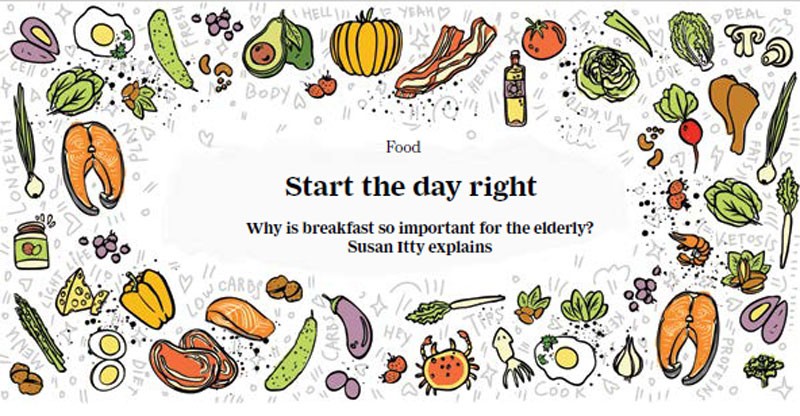Why is breakfast so important for the elderly? Susan Itty explains.
Come 60, and our mind dolorously veers towards the sunset years, the downslide and the degeneration. But why let those dark thoughts hover around. Make some smart, simple moves to swing into your sixties and seventies. The buzz word is breakfast. Start with some wholesome, nutritious breakfast and watch yourself happily whirl all day.
Older adults often consume less food at one sitting, so eating breakfast helps ensure an adequate intake of calories, vitamins, and minerals throughout the day. Older adults may have a difficult time consuming adequate nutrition due to decreased absorption efficiency or high cost of healthy foods. Therefore, seniors are at an increased risk for malnutrition, which can decrease their quality of life. Inexpensive, soft, easy-to-prepare breakfast foods are ideal for seniors.
What comprises a good breakfast?
Eggs: Eggs make excellent breakfast food for seniors. Older adults require more protein to ward off muscle loss that commonly occurs as you age. Eggs are rich in protein, easy to prepare and economical, making for a portion of excellent breakfast food for older adults. Moderation is still the key but it’s no longer necessary to restrict cholesterol intake. This means seniors can enjoy whole eggs instead of just egg whites.
Oatmeal: Oatmeal is an excellent breakfast food for seniors because it is fairly inexpensive, easy to chew, easy to prepare, nutrient-dense and high in fiber. Low-fiber diets are the main cause of constipation in older adults. Seniors are encouraged to consume at least 30 grams of fiber.
Soft Fresh Fruits: Fresh fruits are excellent sources of dietary fiber and vitamins for seniors. Soft fresh fruits that are easy to chew and swallow include bananas, papaya, pureed apple, etc. Sprinkle sliced soft fruits on top of regular oatmeal or breakfast cereal like ragi, Rava prepared with low-fat milk or soya milk.
Smoothies: High-protein smoothies make a quick breakfast for seniors, don’t require chewing and are easy to prepare using a blender. Ingredients commonly used in breakfast protein smoothies include low-fat milk or soya milk, low-fat yogurt or soy yogurt, soft fruits, and peanut butter.
Idli and dosa is said to be light as it contains no fats, saturated fats or cholesterol. For the small-scale wonder, idli packs a good punch of protein, fiber and carbohydrates. In single idli, you would consume 2 grams of protein, 2 grams of dietary fiber and 8 grams of carbohydrates.
Soft veg Upma/ Dalia/ Poha: Rava, which is used to make upma, is rich in protein, vitamin B and iron. Adding veggies to the upma not only makes it tastier but also healthier. Poha is a wholesome meal. It is a good source of carbohydrates and iron, rich in fibre, a good source of antioxidants and essential vitamins. It is known to be good for those who have diabetes, skin and heart problems.

Why are some nutrients particularly important for seniors?
Calcium and Vitamin D: Older adults need more calcium and vitamin D to help maintain bone health. Have three servings of calcium-rich foods and beverages each day. This includes fortified cereals, dark green leafy vegetables, soya bean, egg, fish with soft bones, milk.
Vitamin B12: Many people older than 50 do not get enough vitamin B12. Fortified cereal, lean meat and some fish and seafood are sources of vitamin B12.
Fiber: Eat more fiber-rich foods to stay regular. Fibre also can help lower the risk of heart disease and prevent Type 2 diabetes. Eat whole-grain bread and cereals, and more beans and peas along with fruits and vegetables which also provide fiber.
Fluid: The most important way to prevent dehydration in elderly adults is to make sure that they are drinking enough liquid. Seniors and all adults should drink at least 8-10 glass of fluids such as water or non-caffeinated beverages such as clear soup, lime water, tender coconut water, thin buttermilk, etc daily. Caffeinated beverages cause frequent urination and promote dehydration.
So, make breakfast your most important meal of the day. You skip it, and you are sure to play havoc with your levels of sugar, cholesterol, calcium, and vitamins. Be wise, stay vibrant!

Susan Itty is Chief Clinical Nutritionist at Aster Medcity and has extensive experience in managing nutrition of hospitalised and critical care patients








